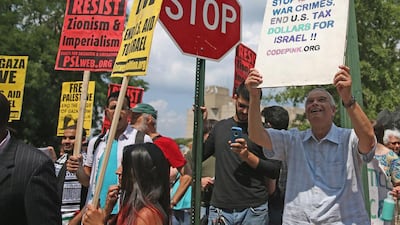How do you solve a problem like Benjamin Netanyahu? That has been the question on everyone’s minds over the past two weeks, as missiles have rained down on the caged population in Gaza.
Mr Netanyahu has been one of Israel’s most influential politicians of recent years. But his influence has been negative for Israel and, especially, for Palestinians. His security narrative has been adopted wholesale by other politicians, who no longer see the occupation of Palestinian lands outside of that narrow prism.
As Mr Netanyahu admitted in an interview this week, he has no intention of ever allowing a two-state solution to exist – and never had any such intention. This despite declaring five years ago – admittedly under intense pressure from Barack Obama – that he supported the creation of a Palestinian state.
That is still an astonishing admission. The peace process – a phrase now surely condemned to always be uttered between quotation marks – has taken up an extraordinary amount of America’s time over the past two years, requiring US secretary of state John Kerry to fly in and out to keep the two sides engaged, as well as the time and resources of other European and Arab countries.
What Mr Netanyahu’s admission means is that he knowingly wasted all that time, money and political capital. (Perhaps Mr Kerry should bill him for those hours in the air, or else claim it back from the cheque the US hands Israel every year.
The success of Mr Netanyahu is also a failure of moderate Israeli politics. The bankrupt vision of the future that both Likud and Kadima espouse has not been opposed by the moderate centre. Labor, ostensibly a part of the centre-left, has been curiously silent throughout this Ramadan’s war.
Nor can Mr Netanyahu’s own allies rein him in. They have not been silent throughout the Gaza bombardment: Likud’s most important coalition partner, Yisrael Beiteinu, has ended the arrangement because, astonishingly, they believe Israel’s prime minister is too soft on Gaza.
Even the Israeli public is curiously disengaged: two months ago, when Israel’s then president Shimon Peres revealed that Mr Netanyahu had torpedoed a peace deal he had reached with Mahmoud Abbas, there was scarcely an outcry. In any other country, that would have been a significant political scandal.
Who then can rein in Israel? The Gaza offensive has shown two things: that the country under Mr Netanyahu has no regard for international law nor for international public opinion. If neither Israel’s own politicians nor its biggest donor can make the country respect those two elements, then the pressure has to come from somewhere else.
One way, as implied by the Arab League this week, is for the creation of an international peace keeping force to keep Israeli and Palestinian areas separate and police the peace. Such a force would be similar to that which polices the southern Lebanese border with Israel, comprised of UN troops whose mandate is simply to keep the two groups apart.
The second method of international pressure is already on-going. Nine years ago this month, Palestinian civil society issued a call for the international community to boycott, divest and sanction Israel until it complied with international law.
The call was explicitly inspired by and modelled on the boycott of South Africa that finally ended apartheid. Supporters of Israel intensely dislike that analogy – when John Kerry used it in a private meeting with international officials in April, there was furious criticism from pro-Israel lobby groups in the US. Mr Kerry eventually apologised, but that such a careful politician had used the word left the impression that it was intended.
Certainly, the analogy and the BDS movement has galvanised action from the international community. One prominent Israeli politician last month called it the single “greatest threat” to the country.
There is indeed little doubt that the BDS campaign has been astonishingly successful in its nine years. As with the boycott of South Africa, small initial changes end up having far-reaching consequences.
Exactly a year ago, the European Union issued guidelines insisting that any future agreement between the EU and Israel must explicitly exclude the colonies in the West Bank. The move – described in Israel as “an earthquake” – was seen as a success for the BDS movement. It was a small bureaucratic step that became a giant political leap.
Earlier this year, the EU, following the legal logic of the guidelines, banned the importation of poultry and eggs produced in settlements. Though small, such moves have normalised the BDS campaign and provided political cover for other governments and companies to follow suit, particularly in the US, where criticism of Israel remains politically sensitive.
Within months, the largest pension fund in the Netherlands pulled out all its investments from Israel’s largest banks. The Norwegian government excluded Israeli companies from its own pension fund and Denmark’s largest bank blacklisted Israel’s largest bank. In the US, the largest Protestant church divested from a security company that operates in Israel’s prison system.
The BDS movement remains an imperfect mechanism for pushing Israel’s politicians to adhere to international law. But it is certainly one part of the solution. Without international pressure, it is clear politicians of Mr Netanyahu’s generation will only ever accept the “process” and never the “peace”.
falyafai@thenational.ae
On Twitter: @FaisalAlYafai


